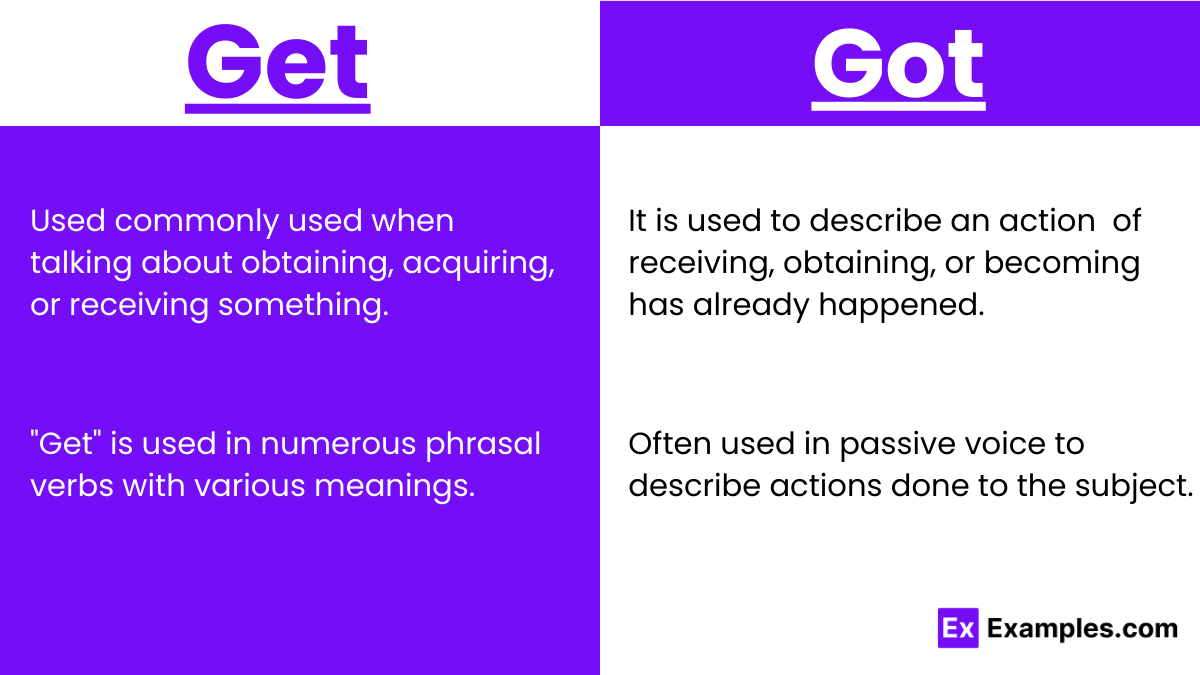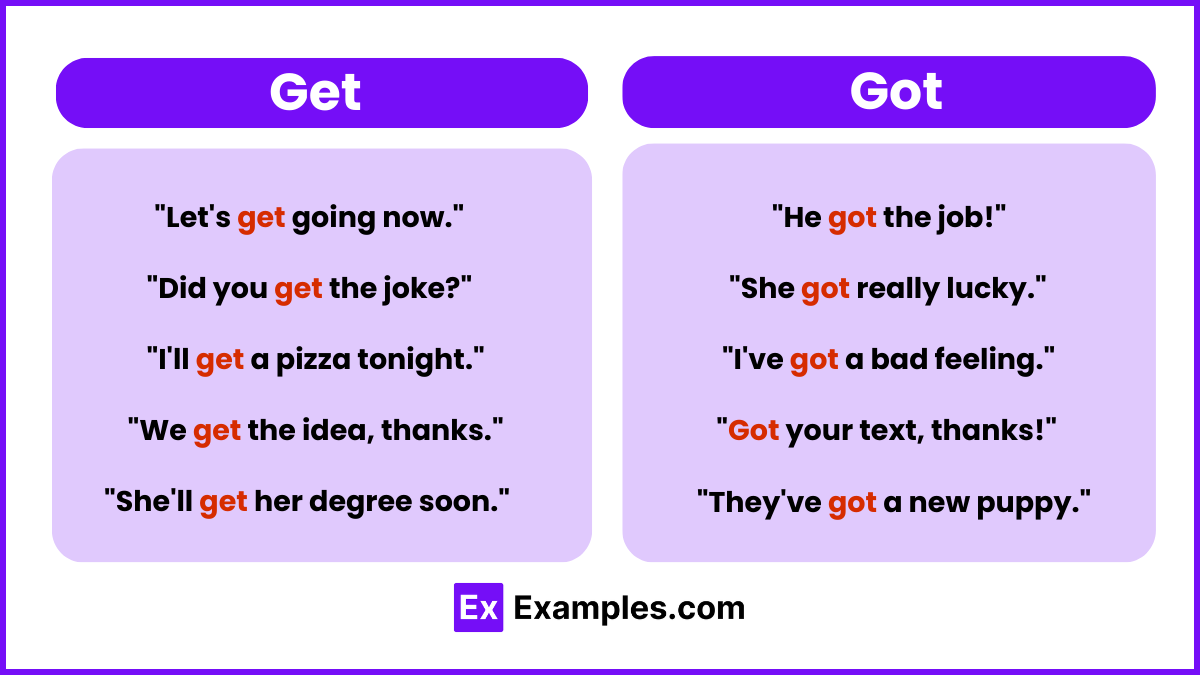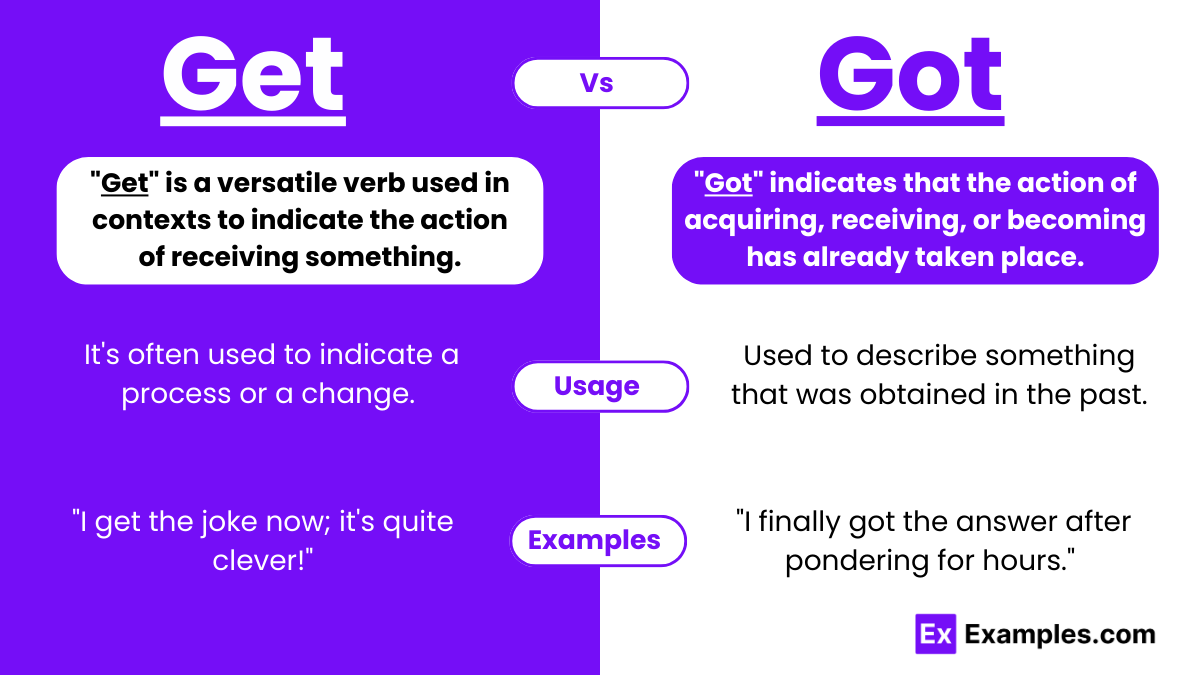Get vs Got – Meanings, Difference, Examples, Usage
We often use phrases like “I get it” and “I got it” to express our understanding. How we say these phrases can change their meaning—a frustrated “I get it, Mom” from a teenager, a confident “I got it, Mom” to show immediate understanding, or an excited “I get it now!” from a student who’s overcome a challenge. Let’s dive into how “get” and “got” capture these moments of clarity and how tone influences their impact.
Get and Got – Meanings
- Get: “Get” is a versatile verb used in various contexts to indicate the action of receiving, obtaining, or acquiring something. It can also denote becoming or reaching a particular state or condition. The versatility of “get” makes it one of the most frequently used verbs in English.
- Got: “Got” is primarily the past tense and past participle form of “get” in American English. In British English, “got” serves as the past tense, while “gotten” is often used as the past participle. “Got” indicates that the action of acquiring, receiving, or becoming has already taken place.
Summary
“Get” is a verb we use to talk about receiving, understanding, or becoming something right now. For example, if you suddenly understand a joke, you might say, “I get the joke.” On the other hand, “got” is the past form of “get,” and we use it to talk about things that happened before. So, if you’re talking about understanding a joke yesterday, you’d say, “I got the joke yesterday.”
How to Pronounce Get and Got
- Get: Pronounced as /ɡɛt/ (get).
- Got: Pronounced as /ɡɒt/ in British English and /ɡɑːt/ in American English (got).
Differences between Get and Got
| Aspect | Get | Got |
|---|---|---|
| Tense | Present or future contexts, indicating the action of receiving or becoming. | Past tense, indicating the action has already occurred. |
| Usage | Broader usage, including forming phrasal verbs and expressions. | Limited to past events or states; often used in passive constructions. |
| Connotation | Can imply the process or act of acquisition or change. | Implies completion or the past state of acquisition or change. |
| Example Context | “I will get a new book tomorrow.” | “I got a new book yesterday.” |
How to Remember the Difference between Get and Got
To easily remember the difference between “get” and “got,” think of “get” as “yet to happen” and “got” as “already happened.” This simplifies it to a time-related concept: if something is happening now or in the future, use “get“; if it’s already occurred in the past, use “got.”
When to Use Get and Got

Usage of Get
Use “get” when you’re referring to the action of receiving, obtaining, or becoming something. It’s often used to indicate a process or a change. For instance, “I need to get some groceries” implies you need to obtain groceries, while “I’m starting to get tired” indicates a change in your state of becoming tired.
- Acquiring or Receiving: When talking about obtaining or receiving something.
- Becoming or Changing State: To describe a change of state or becoming something.
- Forming Phrasal Verbs: “Get” is used in numerous phrasal verbs with various meanings (e.g., “get up,” “get along”).
Usage of Got
Use “got” as the past tense of “get,” indicating that the action of receiving, obtaining, or becoming has already happened. For example, “I got a new bike for my birthday” means you received a bike in the past. “I got tired after the long walk” shows a change that occurred previously.
- Past Acquisition: To describe something that was obtained or received in the past.
- Past State Change: When referring to a change that occurred in the past.
- Passive Constructions: Often used in passive voice to describe actions done to the subject (e.g., “I got invited”).
Get and Got – Examples

Examples of Get
- Furthermore, when you get the opportunity, always make the most of it.
- Consequently, if you don’t get enough sleep, your concentration levels might drop significantly.
- For instance, you might get a better understanding of the subject if you study consistently.
- However, even if you get all the right tools, success isn’t guaranteed without hard work.
- Therefore, to get ahead in your career, continuous learning is essential.
- Moreover, if you get regular exercise, your overall health is likely to improve.
Examples of Got
- I got a message from John saying he’d be late.
- She got the promotion she had been working hard for.
- I got the chance to travel abroad, which was an eye-opening experience.
- They got caught in a heavy rainstorm on their way home.
- We got the approval we needed to start the project.
- I got the impression that the task would be straightforward, but it turned out to be quite complex.
Synonyms
| get | got |
|---|---|
| Acquire | Acquired |
| Obtain | Obtained |
| Receive | Received |
| Become | Became |
| Arrive | Reached |
Exercise
Fill in the blanks with either “get” or “got“:
- She has _____ a lot of support from her friends.
- They will _____ to the airport early to avoid traffic.
- I haven’t _____ any response to my email yet.
- He _____ the highest score in the game last night.
- We need to _____ ready for the meeting soon.
- She _____ a new pet for her birthday last year.
Answers
- got
- get
- got
- got
- get
- got
FAQ’S
What is the difference between get and have got?
“Get” implies acquiring or becoming. “Have got” means possessing or having obtained something, often used in British English.
What is the difference between get to and got to?
“Get to” implies having the opportunity or permission, while “got to” suggests necessity or obligation.
Is it grammatically correct to say I got?
Yes, “I got” is grammatically correct when referring to past acquisition or a change in state.
What is the use of got?
“Got” is used to indicate past possession, acquisition, or a change in condition.
What is an example of got?
An example of “got” is, “I got a new job last month,” indicating past acquisition.


